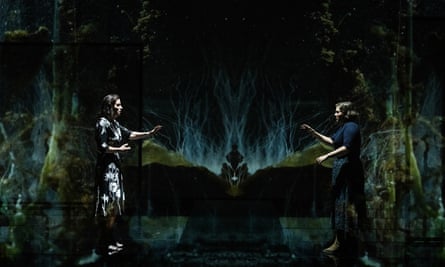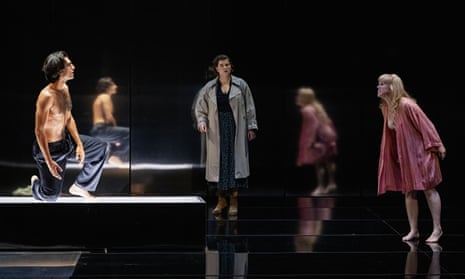A mother mourns for her dead child. Refusing to allow his body to be cremated, she is offered the possibility of a miracle – find a truly happy person before the end of the day and cut a button from their sleeve, and the child will be restored to life. Given an itinerary, a list of those who might really be happy, the unnamed woman sets off on her quest. Picture a day like this, George Benjamin’s fourth opera, and like its predecessors a collaboration with the dramatist Martin Crimp, has the feel of a modern fairytale, closer to the timeless, magical world of Benjamin and Crimp’s first stage work together Into the Little Hill, a retelling of the story of the Pied Piper, than to the troubling medieval cruelty of the two larger-scale works that followed, Written on Skin and Lessons in Love and Violence.
Crimp’s sources this time were a mix of European and Buddhist folk tales, and an ancient near-eastern romance, but the woman’s search is couched in thoroughly modern imagery. It turns out to be increasingly futile: the “happiness” of all those she encounters – a pair of lovers, an artisan craftsman, a composer, a wealthy collector – proves to be illusory or compromised, until finally, in a beautiful, tranquil garden, she meets Zabelle, a woman very like herself, and realises what her way forward might be.
The ending seems profoundly ambiguous, and the whole opera has a dream-like insubstantiality; are the characters intended to be real, or ciphers, embodying the stages in the woman’s journey through grief? That sense of enchanted mystery seems only to be enhanced by the measured unfolding of Benjamin’s score, with its gracefully contoured vocal lines, in which every morsel of the text is perfectly clear, and exquisitely crafted instrumental writing, full of luminous colours and doublings, beautifully realised by members of the Royal Opera House Orchestra. Perhaps the dramatic pace is sometimes a little unvaried, but the world the music creates is utterly distinctive.

Picture a day was first performed at the Aix-en-Provence festival in July, and the UK premiere at the Linbury uses the same production, directed and designed by Daniel Jeanneteau and Marie-Christine Soma. For the most part their staging matches the spareness of the work itself, though it tends to overlook the moments of wit and dark humour that Crimp sneaks into his text, and overdoes the depiction of Zabelle’s garden in the final scene, when video projections create a strange aquatic world of algal growths and bubbles, which seems both irrelevant and superfluous.
Three of the singers repeat their roles from Aix – the soprano Beate Mordal is one of the Lovers and the Composer, the counter tenor Cameron Shahbazi is the other Lover and the Composer’s Assistant, and baritone John Brancy is the Artisan and the Collector. Ema Nikolovska as the Woman, stoic, persistent and finally disillusioned, and Jacquelyn Stucker as Zabelle, utterly at peace with herself, are new to their roles; all of them, together with the conductor Corinna Niemeyer, bring the world that Benjamin has created movingly to life.

Comments (…)
Sign in or create your Guardian account to join the discussion